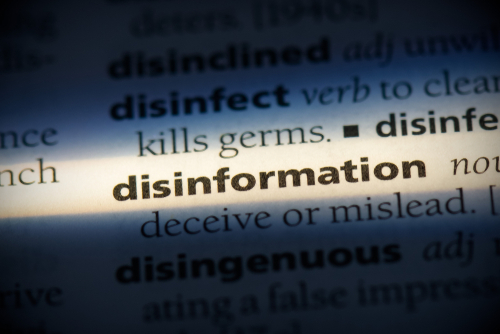How can courts counter disinformation? Arizona task force releases recommendations

Image from Shutterstock.com.
An Arizona panel has called for court officials in the state and throughout the country to do more to address the threat of disinformation targeting the justice system.
In a report dated Oct. 1 and distributed Friday, the Arizona Supreme Court’s Task Force on Countering Disinformation issued a series of recommendations for how courts can counter foreign and domestic campaigns that aim to discredit the judicial branch.
The release of the Arizona guidance comes amid ongoing national efforts to help courts and lawyers fight back against Russia’s information warfare and similar efforts by other actors.
“When discussing disinformation, there is abundant and clear evidence that malicious actors are intent on sowing discord and distrust in U.S. democratic institutions,” the Arizona report states. “The courts and the rule of law are prime targets for these campaigns and the judicial branch would be well served by proactively preparing their responses.”
The task force’s Arizona-specific recommendations include:
- • Establish a rapid response team to address situations in which disinformation targeting a judicial branch individual, a court or a court system happens and publish a comment to the Arizona Code of Judicial Conduct Rule 2.10 “to provide guidance as to how and when such instances should be addressed.”
- • Amend the Arizona Code of Judicial Conduct “to affirmatively state that a judge, whether elected or appointed, or the judge’s designee, may respond to attacks on the judge’s actions, character or reputation” so long as the response otherwise complies with the code’s requirements.
- • Redesign the court system’s interactive civics program, “nominate a court liaison to Arizona’s K-12 statewide educational program committee(s) and expand the judicial branch’s community outreach.”
- • Make federal public information available in Arizona regarding registrations as foreign agents under the Foreign Agents Registration Act.
According to the report, the task force “aimed to make immediately effective recommendations toward improving and maintaining public trust and confidence in courts and to serve as a starting point for other court systems.”
The panel also said some of its suggestions will require multistate partnerships and years of follow-up. Those recommendations include:
- • Establish a national, centralized point of contact to assist in identifying disinformation and having it flagged or, if warranted, removed while respecting the expression of individual opinions and the exercise of First Amendment rights.
- • Establish a local/national disinformation study network “to report back with data-driven and anecdotal findings on the prevalence of anti-judge and anti-court disinformation in the states and in the U.S.”
The Center for Strategic and International Studies and the ABA Standing Committee on Law and National Security have previously launched a campaign to help educate courts and lawyers throughout the country about the disinformation threat and how to effectively respond.
The National Center for State Courts has been closely involved with such efforts, including through workshops that it has hosted for court leaders.
Additionally, at the ABA Annual Meeting in August, the House of Delegates approved Resolution 300B, which urges every level of government in the United States “to promote digital literacy, civic education and public awareness to build societal resilience to domestic and foreign malign disinformation operations.”
Meanwhile, the Arizona disinformation report will be presented to the state’s judicial council later this month, according to an email from Aaron Nash, the task’s force chair and the communications director of the Arizona Supreme Court.
The council will direct which recommendations are implemented and whether they will be modified, he wrote. The task force has also recommended that its term be extended until December 2021 to assist with implementation efforts.



